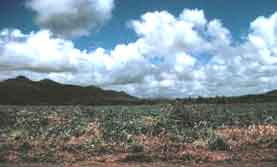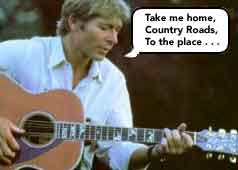|
|
- Homeless No More |
|
The apartment is a two bedroom with a large, open living, dining and kitchen area ( I need to warn you that large over here is relative). There are a lot of windows, and sliding doors go across the whole length of the apartment. The door to the bedroom is short and Richie just misses hitting his head on the top door jam. One of the rooms is a tatami room with matts and rice paper sliding doors on one side. We may use the tatami room to sleep in or as an office depending on the amount of air conditioner that filters through the room.
We have a Japanese oven and clothes dryer. One of the first things the housing agencies tell you when you are looking for an apartment is that you can't cook a turkey in the oven. I guess they know that most Americans cook turkey for Thanksgiving and their ovens are too small. So this year we have fish for Thanksgiving. The Japanese dryers don't dry your clothes they just get them hot so we are getting an American dryer from the military base.
The apartment is on the second floor and has two balconies. The one on the front of the building goes the length of the apartment with sliding doors from each room. There are typhoon shutters on the outside that can be pulled across the sliders to protect us from the typhoon winds. Lets hope we don't have to use them. The balcony on the back of the apartment is for hanging clothes to dry. It has a concrete wall on the outside with decorative concrete blocks that are open for air to come through. You can see through the wall to the hill beyond where there is a large castle built into the hillside. The castle is empty and we are told it's a great place to explore.
Once we get the musty and mildewy smell out of the closets, I think we will have plenty of room for our stuff. Everything on this island is damp but they tell us the smell will go away when the place is opened up and lived in. I hope they know what they are talking about.
Now we have to go to the military base housing office where we order our furniture. The selection is not great but at least we won't have to sit on the floor all the time.
We got our permanent driver licenses this week. We had to attend an hour and one half class that told us more about the local hazardous wildlife (just what I needed to hear) than about driving on this island. We learned that the Habu Snake is aggressive but most will avoid human contact if possible. Some how I wasn't too comforted. It is nocturnal and caution is recommended when walking at night. They are poisonous and can be 6 feet long. If bitten you must get to medical help immediately. What does that have to do with my driving on the wrong side of the road?
We also heard about Stonefish, Lionfish, Sea Urchins and Cone Snails. All of these creatures should be avoided because they can do you great harm from paralyzation to death. Now they expect me to get back in this water? After we hear about these critters we are given water safety tips and all I want to do is get my driver's license.
We have been fortunate enough to see the bats on the island. Richie swore the bat was a bird. I was pretty sure it wasn't a bird because it was dark out and birds don't fly at night. This bat was as big as a crow and flew right over our heads. The wings were the shape of a bat and I understand if you look carefully you can see them hanging in the trees. I am not looking!
They finally got to the driving stuff and showed us the Okinawa road signs (see week two). The stop sign is a triangle and looks just like a yield sign in the States. That's ok, most Americans yield at stop signs anyway. All the speed limits are in kilometers but so is the odometer so I don't have to convert all that stuff. You pass on the right instead of the left. Makes sense when you are driving on the left. All accidents are the fault of the American if an Okinawan is involved so don't get in an accident. I can buy that. We are now what is considered professional drivers on this island and take full responsibility for our driving.
Saturday night we went to Higa-san's house for a cook out and to meet the rest of his family. We knew we could find the place because we paid special attention to the road signs and turns when we left last week. Somehow things looked a little different this time. We knew we were close but we just couldn't seem to find his street. Finally we saw a park full of Japanese men sitting on picnic tables. I figure, if Higa-san is as famous as he seems somebody in this park should know him so I got out and asked if anybody knew Higa-san's house. Well they all started pointing in the same direction on up the road where we had gone round and round and didn't recognize any houses. I said, " up there" and pointed in the same direction. They started shaking their head yes and repeating "Hai" (yes in Japanese). No one could speak English and you know how good my Japanese is. So I got back in the car.
We drove around some more in the direction that everyone was pointing. We started back toward the park and Richie said, "I am turning around - we are not going back past that park again". So we turned around and went down another narrow street. We saw a woman on her back patio so Richie rolled down the car window and asked if she knew High-san's house. She smiled and just shook her head no, like she had no idea what we were talking about. Further down the road and around another corner was a man standing out by his truck . I got out of the car and this time took the paper where High-san had written his name and phone number. I showed the man the paper and his eyes brightened. He said something that sounded like telephone and I shook my head. He had a cell phone and called the number. He spoke for sometime in Japanese and I knew that High-san was on his way to find us. He arrived with his wife and we followed them back to their house. We were close but we had missed one sugar cane field.
The cook -out was wonderful. There were 25 or 30 people, High-san's family, another American couple from Denver that High-san had picked up on the beach the Thursday before and a Baptist missionary and his son who have been here for fourteen years. We sat on matts and pillows on the patio around a low table. We ate pork, beef, rice, noodles, stir fried vegetables, salads and lots of great tasting sauces. We drank herbal teas, one for the liver and one for overall good health. ( Eva would probably know what kind of tea we were drinking.) I figure with all the strange food I am digesting the herbal teas will help keep me healthy.
The dinner conversation covered a lot of topics. Higa told us about his life as a child on the island. The American soldiers landed in ships just off the beach from his current house. There were so many ships that you couldn't see the water and you could walk from ship to ship like stepping-stones. The Japanese people told the Okinawans that the Americans would skin them alive so they should protect themselves. Higa's father built a hole in the hillside and put Higa and his family in the hole. Higa was a small boy and ventured out one day. An American soldier gave him a piece of chocolate and offered him water from his canteen. His mother yelled at him not to eat or drink from the soldier, that the food and water were poison. Higa was so hunger that he ate the candy anyway. When he didn't get sick or die the family began to wonder if the Americans were as bad as the Japanese had led them to believe.
In our conversation they found out that Richie is a Psychologist. They all started whirling their fingers around their heads and saying shrinky, shrinky. I am not sure if that was good or bad but it made a big hit with them.
High-San's wife, Hannae, played the Japanese version of a banjo and sang for us. She has a beautiful voice. They had a guitar and I told them that Richie plays the guitar so they made him play. He played and sang "Country Roads" which they loved. Richie was another big hit, this time I think it was good. The man from Denver had drums from Turkey and Africa. They are military and have lived all over the world. We all sang and played the instruments like a good old fashion songfest.
About 8 p.m. we heard music in the street that sounded like the tune from the movie Close Encounters. They told us it was the soba peddler. Soba is a Japanese noodle soup and every evening the peddler comes through the streets with his cart on wheels selling soup to the neighborhoods. We could also hear the drums from a distant Oban festival. The festival goes on the whole month of August.
Good memories, good people, good times.
Map of Japan - provided by the CIA
Note: The pictures were not taken by my mom. Pictures were found on the internet. previous week | index | next |
|





